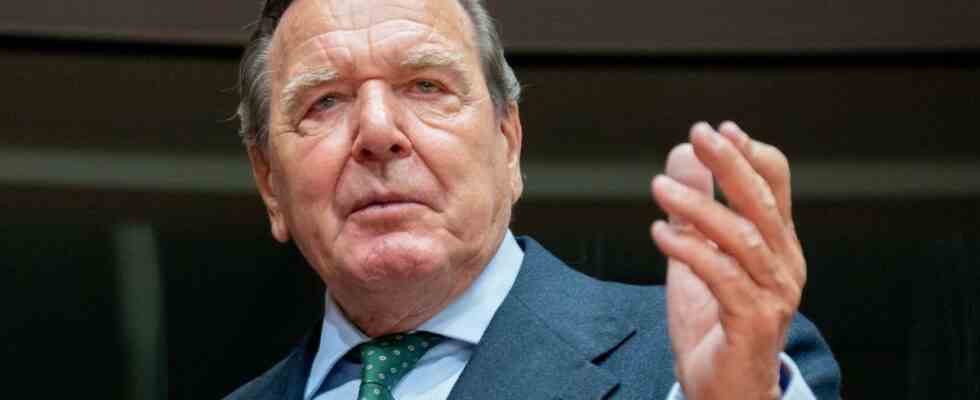Very little was known at first. And yet what is known suggests a surprising turn in an astonishing friendship between men: Former Chancellor Gerhard Schröder will give up his mandate as head of the supervisory board for the Russian oil company Rosneft. Schröder announced that it was impossible for him to extend his mandate on the board, the group said on Friday. Reasons were not given.
But the fact that, in addition to the Social Democratic ex-Chancellor, the German businessman Matthias Warnig, who is closely associated with Schröder, is also leaving the Supervisory Board indicates that there is a political background and that the 78-year-old Schröder is not leaving for reasons of age or health.
Strikingly, Schröder announced that he would be stepping down after the European Parliament voted by a large majority to sanction him alongside other former politicians on Russian payrolls. However, such a decision would have to be taken unanimously by the EU states. Chancellor Olaf Scholz only described such a step as “not necessary” on Thursday evening. It is rather unlikely that the chancellor knew by then that Schröder would be leaving Rosneft. There should be no contact between Scholz and Schröder.
The post at Rosneft, which Schröder accepted in the middle of the 2017 federal election campaign, much to the displeasure of the SPD and their candidate for chancellor, Martin Schulz, is said to have been worth $600,000 a year. How Schröder will deal with the two mandates on the boards of directors of the gas pipelines Nord Stream and Nord Stream 2 initially remained open on Friday. The same applies to the question of whether the ex-chancellor will accept the offer to join the supervisory board of the semi-state-owned Gazprom group. Schröder had not publicly committed to this until now.
Shortly after the end of his term in office in 2005, the ex-chancellor was invited by President Vladimir Putin to join Nord Stream’s supervisory board. He sees it as the logical consequence of his commitment to the pipeline during his chancellorship. Critics always accused him of mixing political and personal interests. But Schröder later accepted other mandates in the Russian energy sector.
After the annexation of Crimea by Russia in 2014 and even more because of the attack on Ukraine last February, Schröder came under massive pressure because of his business relationships, but also because of his personal loyalty to Vladimir Putin. He lost or renounced numerous honorary titles, several SPD district associations initiated expulsion procedures, the employees of his former chancellor’s office in Berlin asked for a transfer, the SPD leadership asked him to leave the party of his own accord, Scholz, once general secretary of party chairman Gerhard Schröder repeatedly asked him to resign his business mandates.
The ex-chancellor, however, defended his post again and again – also with political motives. He also brought himself into play as a possible mediator. If he now distances himself from Putin, Schröder said at the end of April New York Times, he would lose the confidence of the only man who could end the war: Putin. At that time, however, Schröder had already spoken to the Russian President in Moscow at the request of Ukraine, without any tangible results. Nothing is known about further talks. However, Schröder is said to have had in mind being able to build bridges to Moscow after the war.
Schröder also described himself as representing German interests in Russian corporations. As a member of the Rosneft supervisory board, he agreed to the purchase of the oil refinery in Schwedt because – according to the ex-chancellor – he wanted to prevent the sale of the refinery, which is important for the oil supply in northern and eastern Germany, to a private fund. In the event that the Russian government would impose an oil boycott against Germany, he announced his resignation from the supervisory board.
On Thursday, the budget committee of the Bundestag cut Schröder’s funds for his former chancellor’s office in Berlin. His departure from Rosneft shouldn’t change that. Because the SPD, Greens, FDP and Union had not given Schröder’s relations with Russia – although these were of course the political reason – as the official reason for the deletion. Instead, they argued that winding up the office was permissible because Schröder no longer performed any duties related to his chancellorship. Schröder now wants to have this measure legally examined. He has now commissioned the lawyer Michael Nagel in Hanover, who had already successfully defended the former Federal President Christian Wulff against the accusation of taking advantage.

